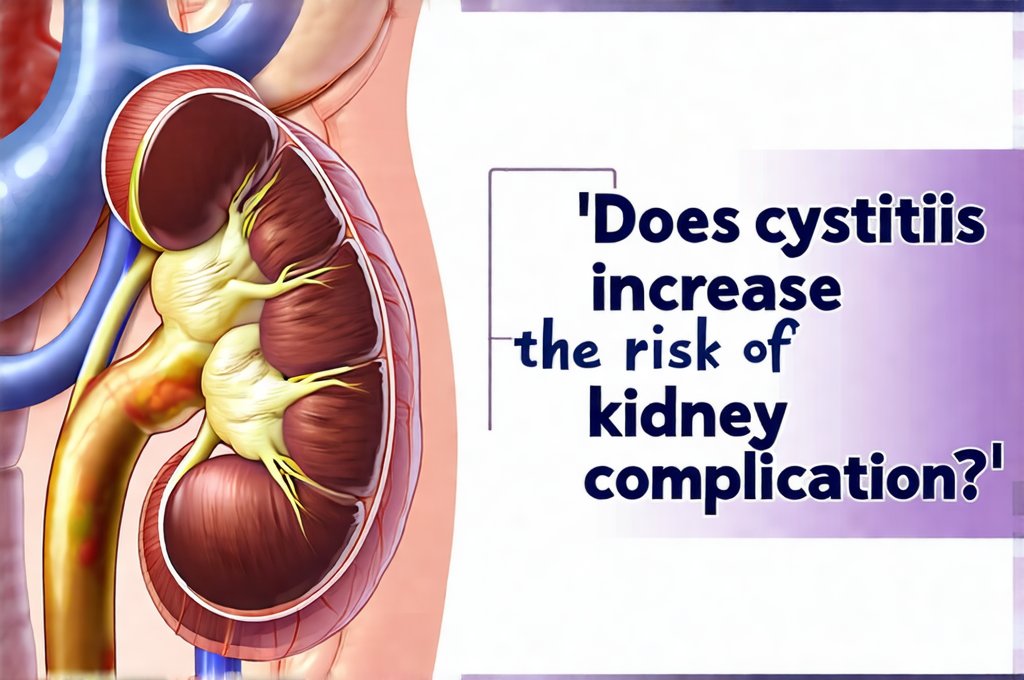Cystitis, an inflammation of the bladder, is a remarkably common condition, particularly among women. Often presenting with uncomfortable symptoms like frequent urination, a burning sensation during voiding, and lower abdominal discomfort, it’s frequently attributed to bacterial infections – though other causes exist. While many cases resolve quickly with antibiotic treatment or supportive care, concerns often arise regarding potential long-term consequences, specifically the risk of kidney complications. This anxiety stems from the proximity of the bladder to the kidneys and the understanding that untreated or recurrent cystitis could ascend to involve these vital organs. Understanding the nuanced relationship between cystitis and kidney health is crucial for both prevention and appropriate medical intervention.
The core question isn’t simply whether cystitis can lead to kidney problems, but rather how likely this progression is, under what circumstances it’s most probable, and what steps can be taken to mitigate the risk. It’s important to distinguish between uncomplicated cystitis – a straightforward infection confined to the bladder – and more complex scenarios involving underlying anatomical abnormalities, immune deficiencies, or chronic conditions. These factors significantly influence the potential for complications. This article will explore this relationship in detail, offering clarity on the various pathways by which cystitis can impact kidney health, the types of kidney complications that may occur, and strategies for minimizing risk.
The Path from Bladder to Kidney: Understanding Ascending Infection
The most direct pathway linking cystitis to kidney complications is ascending infection. This occurs when bacteria initially present in the bladder (causing cystitis) travel upwards through the ureters – tubes connecting the kidneys to the bladder – and eventually reach one or both kidneys, resulting in a condition called pyelonephritis. Pyelonephritis represents a more serious infection than cystitis, often accompanied by fever, flank pain, nausea, vomiting, and general malaise. – The anatomy of the urinary tract facilitates this upward spread; the ureters enter the bladder at an angle that can allow for backflow under certain circumstances. – Factors like incomplete bladder emptying (due to obstruction or nerve issues) or a weakened immune system can increase susceptibility to ascending infection. – Prompt and effective treatment of cystitis is vital to prevent progression, as untreated infections are more likely to ascend.
However, it’s crucial to note that not all cases of cystitis progress to pyelonephritis. In many instances, the body’s natural defenses – a healthy immune system combined with appropriate antibiotic therapy – effectively clear the infection before it reaches the kidneys. Furthermore, structural abnormalities in the urinary tract can either increase or decrease the risk of ascent. For example, vesicoureteral reflux (VUR), where urine flows backward from the bladder into the ureters and kidneys, significantly elevates the likelihood of ascending infection. Conversely, a normally functioning urinary system with no obstructions offers greater protection. Understanding how does diet affect kidney stone formation can also help mitigate risk factors contributing to obstruction and infection.
Long-Term Kidney Consequences: Beyond Acute Pyelonephritis
While acute pyelonephritis is itself a serious concern requiring immediate medical attention, the long-term consequences of kidney infections are what truly drive concerns about cystitis’ impact on renal health. Repeated or severe episodes of pyelonephritis can lead to several chronic conditions. – Renal scarring is perhaps the most common outcome; repeated inflammation causes permanent damage to kidney tissue, reducing its functional capacity. – Chronic kidney disease (CKD) may develop over time as a result of cumulative scarring and loss of nephrons (the filtering units of the kidneys). CKD can progress through stages, eventually potentially leading to kidney failure. – In some cases, recurrent pyelonephritis can contribute to hypertension (high blood pressure), further accelerating kidney damage.
The risk of these long-term consequences is significantly influenced by factors like age, overall health, and the presence of underlying kidney disease. Children are particularly vulnerable to renal scarring from pyelonephritis because their kidneys are still developing. Adults with pre-existing kidney conditions or compromised immune systems also face a higher risk. It’s important to emphasize that not everyone who experiences pyelonephritis will develop chronic kidney disease; many individuals recover fully without long-term complications, especially if promptly and appropriately treated. Recognizing what are the symptoms of kidney stress in women can lead to earlier diagnosis and intervention.
Identifying Individuals at Higher Risk
Determining which individuals are most susceptible to kidney complications from cystitis is essential for targeted prevention and monitoring. Several key risk factors stand out:
- Recurrent Cystitis: Frequent bladder infections increase the likelihood of ascent and cumulative kidney damage. Individuals experiencing multiple episodes within a year should be evaluated for underlying contributing factors, such as anatomical abnormalities or immune deficiencies.
- Vesicoureteral Reflux (VUR): As mentioned earlier, VUR allows urine to flow backward into the kidneys, dramatically increasing the risk of ascending infection and subsequent scarring. Children with VUR often require specific management strategies to prevent kidney damage.
- Diabetes: Individuals with diabetes are more prone to urinary tract infections due to impaired immune function and altered glucose levels in their urine, which can promote bacterial growth. Diabetes also exacerbates kidney disease progression.
- Immunocompromised Status: Conditions or treatments that weaken the immune system – such as HIV/AIDS, chemotherapy, or immunosuppressant medications – increase susceptibility to both cystitis and pyelonephritis.
- Urinary Obstruction: Any blockage in the urinary tract (e.g., from kidney stones, enlarged prostate, or tumors) can impede complete bladder emptying, increasing the risk of infection ascending to the kidneys.
Diagnostic Tools for Assessing Kidney Health
Regular monitoring is crucial for individuals identified as being at higher risk. Several diagnostic tools are available to assess kidney function and detect early signs of damage:
- Urinalysis: A simple urine test can identify bacteria, blood cells, or protein in the urine, indicating infection or kidney dysfunction.
- Urine Culture: This test identifies the specific type of bacteria causing a urinary tract infection, guiding antibiotic selection.
- Blood Tests (Creatinine and eGFR): Measuring creatinine levels in the blood and calculating estimated glomerular filtration rate (eGFR) provides an assessment of overall kidney function. A decreasing eGFR indicates worsening kidney health.
- Imaging Studies (Ultrasound, CT Scan): These imaging techniques can reveal structural abnormalities in the urinary tract, such as VUR or obstructions, and assess the size and shape of the kidneys. DMSA scans are specifically used to detect renal scarring. Does urinalysis show signs of kidney stones can also aid in diagnosis.
Proactive Prevention Strategies: Minimizing Risk
While cystitis itself may sometimes be unavoidable, several proactive steps can significantly reduce the risk of kidney complications: – Prompt Treatment: Seek medical attention immediately if you suspect a urinary tract infection and complete the full course of prescribed antibiotics. – Hydration: Drinking plenty of water helps flush bacteria from the urinary tract. – Good Hygiene Practices: Wiping front to back after using the toilet, urinating after intercourse, and avoiding harsh soaps can help prevent bacterial contamination. – Manage Underlying Conditions: Effectively managing conditions like diabetes and VUR is crucial for minimizing risk. – Regular Check-ups: Individuals at higher risk should undergo regular kidney health screenings as recommended by their healthcare provider. Further, how daily activity reduces the risk of kidney stones can also contribute to overall kidney health.
It’s vital to remember that information provided here is not a substitute for professional medical advice. If you have concerns about cystitis or kidney health, please consult with a qualified healthcare professional for personalized evaluation and treatment.





















